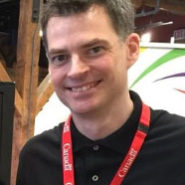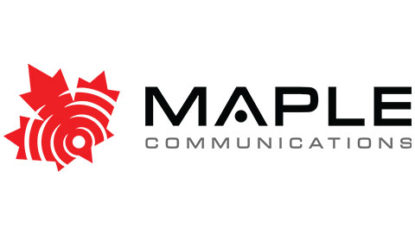
Maple Communications Group Inc.
Devon Currie, Chief Executive Officer
Accessibility Leadership
Devin Currie has been deaf since birth, but spent his life navigating both the hearing and deaf worlds. He was raised orally, meaning that virtually everyone he knew and grew up with didn’t know any sign language. He was always forced to accommodate them. Even though this meant that to some extent he was included in the hearing world, he also felt as if he lacked a home of his own. It was only later, when he met the co-founder of Maple Communications, that a new world opened up for him, and he developed a deeper identity around deafness. In another life, Devin was an engineer and entrepreneur. In both careers, he noticed the lack of accessibility—but it never stopped him from achieving and daring great enterprises.
Devin’s own experience makes him deeply aware of the diversity of needs in the deaf community. Some deaf people know no sign language, and some mandate it; Devin’s enterprise is inclusive of all needs. He emphasizes the hiring of deaf people first for any role when hiring. As the sole deaf CEO of a communication access company in Canada, he’s made sure that his voice represents the many people who need to be heard, given equitable access, and included.
With the rapid growth of Maple Communications Group, Devin hopes one day to be the leading Video Relay Services provider in Canada, and to provide the superior service that he knows all Canadians deserve. In his spare time, Devin enjoys traveling, playing frisbee/disc golf, good coffee and food, and learning more about new technologies.
Our Organization
Who We Are
Based in Richmond, BC, Maple Communications provides accessible communication services—sign language interpretation, remote captioning (live and post-production), remote notetaking, pre-recorded scripted sign language videos for webpage/public announcements, consulting services, and sensitivity training workshops across Canada. Services are provided remotely nationwide and onsite where available.
Mission: Our mission is grounded in our CEO’s desire to place the Deaf and hard of hearing on a level playing field with people who can hear (the Hearing) by using interpreters who understand their clients so well that they never distort, exaggerate or ignore any element of the conversation. Using glitch-free technology allows for the Deaf party and Hearing party to communicate effectively and gives clients the capacity to work with us and our interpreters so that we may fully accommodate them. We ensure access to professional interpreters and captioners anytime they are needed, and in doing so, educate the Hearing on Deaf and other accessibility-related needs.
Philosophy: We believe that interpreters bear a major responsibility: to accurately reflect both clients, Deaf and Hearing, in the content and emotion of their communications. Because of their essential position, our interpreters are highly skilled professionals. Maple interpreters are trained to comprehend signs, inflections and intentions, and to provide translation into articulate, appropriate English. Sometimes, interpreters must also serve in the capacity of a cultural mediator in order to promote effective cross-cultural communication.
All of Maple’s interpreters honour our philosophy of fluent and effective communication, and each acts with the skill, talent, and charisma necessary for being an exceptional interpreter. As a prerequisite, our interpreters are immersed in Deaf culture so they may quickly perceive and resolve misunderstandings, and mitigate potential miscommunications. Our interpreters understand that accurate interpretation is crucial and is unconditionally necessary to achieve our goal of equal communication.
Why We Are Involved
Maple is owned-and-operated by Deaf entrepreneurs and is a member of the Inclusive Workplace and Supply Council of Canada (IWSCC). Maple believes in enabling communication so fluid that Deaf and Hearing alike lose awareness of the interpreter between them.
In order to be an accessible employer with a unique understanding of communication barriers, and to encourage the employment of marginalized communities, work opportunities for people with communication difficulties begin with the intention of management. Maple is uniquely positioned to facilitate accessibility initiatives for Canadian companies and entities, as the majority of agencies focused on communication access are operated by interpreters and language service companies that lack the necessary understanding and sensitivity needed in the Deaf, hard of hearing, and deaf-blind communities.
Accessibility Initiatives
- Educating hearing employers on Deaf employees’ need to use preferred interpreters (often the same interpreter) on an on-demand basis in addition to scheduled options. Changing interpreters impacts overall efficacy as new interpreters are unfamiliar with the preferences of individual Deaf (voicing on his/her own, and reliance on interpreters to pick up the subtleties of meaning).
- Many Deaf people are reluctant to use interpreters out of a fear that it might cost them their jobs, even though they require interpreters to do their best work. We are providing access and helping all workspaces become more diverse and inclusive;
- Provide sign language and/or captioning support to: Small Business BC’s Accessibility Month programs; Office of Small and Medium Enterprises’ Small SmallBusiness Information Expo events; City of New Westminster’s Innovation Forum; and many others.
Accessibility Highlights
- The VRI and Education Support projects in progress (ex. City of Surrey), whose implementation will ensure that Deaf Canadians have educational, communication, and employment opportunities equal to those of other Canadians;
- Participated in several of CRTC’s proceedings, which involves advocating for text-based message relay services, E911, Video Relay Services, and captioning;
- Working with Transport Canada on accessible communication for those in the transportation industry;
- Participated in several consultations leading to the development of the Accessible Canada Act;
- National expert on Deaf Rights, Deaf History, Deaf Needs, and Special Education for the Deaf, along with Americans with Disabilities Act (ADA) and Canadian Human Rights Compliance in government and private relations. Educating organizations and deaf communities regarding the Duty to Accommodate provision for each province.
